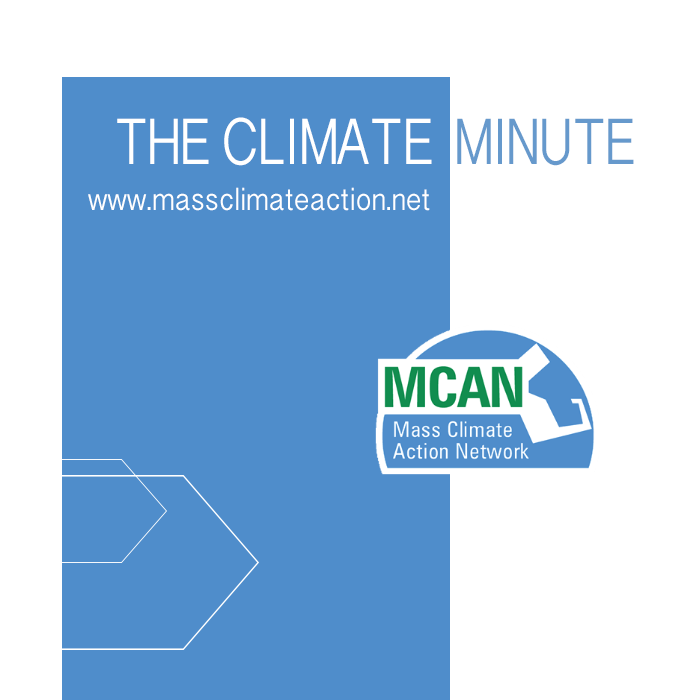
768.5K
Downloads
995
Episodes
The Climate Minute examines current news on global warming, climate change, renewable energy and the prospects for progress on international negotiations, carbon taxes and clean energy policy.
The Climate Minute examines current news on global warming, climate change, renewable energy and the prospects for progress on international negotiations, carbon taxes and clean energy policy.
Episodes

Tuesday Aug 29, 2017
100% Renewables Now! The Climate Minute Podcast
Tuesday Aug 29, 2017
Tuesday Aug 29, 2017
Bill McKibben makes a clear declaration in his new article on how we can get to a sustainable future:
It’s the call for the rapid conversion of energy systems around the country to 100 percent renewable power—a call for running the United States (and the world) on sun, wind and water. What Medicare for All is to the healthcare debate, or Fight for $15 is to the battle against inequality, 100% Renewable is to the struggle for the planet’s future. It’s how progressives will think about energy going forward—and though it started in northern Europe and Northern California, it’s a call that’s gaining traction outside the obvious green enclaves.
Listen in as we discuss!

Friday Aug 25, 2017
Winter is coming: The Climate Minute Podcast
Friday Aug 25, 2017
Friday Aug 25, 2017
It seemed that fact was stranger than fiction in our discussion. We covered the climate implications of the solar eclipse, Geoffrey Supran and Naomi Oreskes’ new paper about ExxonMobil’s climate change communications, and Game of Throne’s “CliFi” subtext.

Saturday Aug 19, 2017
The Baker Plan on the Climate Minute Podcast
Saturday Aug 19, 2017
Saturday Aug 19, 2017
We investigate Baker’s true climate motives, which are heroic in comparison to the clandestine efforts to sabotage the EPA that Scott Pruitt is undertaking. We salute a conservative Texas Mayor whose city runs on renewables. Tune in for those details.

Monday Aug 14, 2017
Finding the right tune: The Climate Minute Podcast
Monday Aug 14, 2017
Monday Aug 14, 2017
Our current administration has been plagued by leaks; this past week there was a leak equivalent to the size of the runoff stream in the Greenland glacier. The New York Times made the unofficial release of the latest National Climate Assessment Report. As a bit of background, this is a series of reports that were congressionally mandated. It was the 1990 Global Change Research Act, which George H. W. Bush signed into law in November of 1990, back when Congress cared, and we had a president that was willing to acknowledge the issue of climate change. Every four years, thirteen government agencies have to prepare a comprehensive report on the impacts that climate change will have on the United States. This particular “leaked” report was originally posted on one of the internet archive sites, and the NYT later published a draft of this report. According to the NYT, the average temperature of the United States has risen rapidly and drastically since the 1980s. Recent decades have been the warmest of the past 1500 years, and there is no evidence that this is caused by anything other than the burning of fossil fuels. This will have a significant impact on the United States. The Boston Globe reports that it will have a very critical impact on the Northeast in particular and now there is a sort of “countdown” because the officials have to sign off on the report by August 18th. Reports such as this have been suppressed, most notably by the George W. Bush administration. David Roberts from Vox wrote that the “report’s conclusion is about as certain as anything gets in the physical sciences.” Roberts went on to say, “But this report is not going make Trump or the GOP do anything.”

Friday Aug 11, 2017
Is biomass right for MA? The Climate Minute Podcast
Friday Aug 11, 2017
Friday Aug 11, 2017
Here in Massachusetts we consider ourselves leaders in the climate change movement. Notable among our many efforts on clean energy is the Global Warming Solutions Act (GWSA), started in 2008. One of the items in the GWSA is a mandate to get to a certain amount of clean energy by the year 2020. As part of that effort to get to the mandated amount of clean energy that we use in MA, an idea has come up to burn biomass—essentially wood—and put it into the “clean energy” category. According to an article in the Boston Globe, the Baker Administration is considering designating biomass for renewable energy and making biomass eligible for clean energy incentives, which is very controversial as you might imagine. The Baker Administration is saying that biomass is part of the so-called “combo platter” of energy that the state needs to rely on and that over time it should not increase carbon emissions. Climate hawks protest because burning biomass will create more pollution in the form of soot and also reduce the trees that are needed to absorb carbon dioxide. As D.R. says, looking at it from a 35,000 foot perspective, branding biomass to be renewable energy as though it is the equivalent of wind and solar reminds him of the famous Reagan initiative to brand ketchup as a vegetable. This is an opportunity to play semantics with what is considered “renewable” and “clean energy.”

Tuesday Aug 08, 2017
One thousand ninety five and three quarter days: The Climate Minute Podcast
Tuesday Aug 08, 2017
Tuesday Aug 08, 2017
Amidst the environmental turmoil of the current administration, the Washington Post tells us we have three years left to act on climate before it is too late; in the meantime, the Supreme Judicial Court prepares to hear Exxon/Mobil’s appeal against Massachusetts Attorney General Maura Healey and Massachusetts utilities try to move us backward while Vermont moves forward on renewables. Tune in for more.

Friday Aug 04, 2017
Every Polluter's Ally: The Climate Minute Podcast
Friday Aug 04, 2017
Friday Aug 04, 2017
In a scathing article in Rolling Stone, Jeff Goodell writes, “While the rest of the Trump administration has been mired in scandal or incompetence (or both)….Pruitt has been quietly tearing down decades of environmental progress.” There is no regulation that seems safe from Scott Pruitt, administrator of the Environmental Protection Agency. We think that a more appropriate title for him would be administrator of Commerce and Fossil Fuels, as his main interests lie squarely in the pro-fossil fuel and pro-chemical corner. We are crossing our fingers (and toes) that Pruitt goes in the same direction as Anne Gorsuch. But Pruitt seems to be using his position to pivot toward a greater political office—perhaps governor or senator of Oklahoma. If there is an environmental disaster along the lines of BP that reveals Pruitt’s incompetence—that could force him out. Al Franken opposed Pruitt’s confirmation and said that “having a guy like Pruitt in charge of the EPA is evidence of the dangerous, bizarro world we now live in.”
The EPA’s “so-called” scientific integrity committee gave Scott Pruitt the clearance to lie. In a panel convened by the committee, they decided that Pruitt did not violate any scientific integrity policy with his claim that there is no connection between CO2 emissions and climate change. The committee’s decision was that, “the freedom to express one’s opinion is fundamental to EPA’s Scientific Integrity Policy, even (and especially) when that point of view might be controversial.” In an article for ThinkProgress, Joe Romm noted that this committee misinterpreted the statutes of EPA. The committee cherry-picked sentences from the statutes and used a section of the policy that was intended to apply to internal disagreements; furthermore, the “opinions” expressed needed to be backed up by rationale submitted internally, preferably in writing. If the opinion is expressed externally, the scientists and managers of the EPA must clarify that they are presenting personal views and not the views of the EPA. A plain reading of the EPA statutes makes it clear that Pruitt violated EPA policy when he denied the factual connection between CO2 and climate. Apparently, scientific integrity is another entity that has been corrupted by the Trump Administration.
Understandably, many dedicated EPA officials are leaving the EPA. Notably, Elizabeth Southerland resigned today, citing Trump and Pruitt as problematic. Elizabeth worked at the EPA for 30 years and was Director for the Office of Science and Technology for the Agency’s Water Office when she submitted her resignation. Her farewell letter is posted publicly by Public Employees for Environmental Responsibility (PEER). It is a stirring letter, but the sad element of the resignation is that all of these veteran EPA officials who have the knowledge, passion, and commitment to the EPA’s mission are essentially being chased out by the Trump administration. In her letter, Elizabeth writes, “Today the environmental field is suffering from the temporary triumph of myth over truth…The truth is there is NO war on coal, there is NO economic crisis caused by environmental protection, and climate change IS caused by man’s activities.” She mentioned that the current repeal two regulations for every new regulation implemented creates a kind of “Sophie’s Choice” situation. Should the EPA repeal the laws protecting infants from neurotoxins so that a new rule designed to protect adults from a newly discovered liver toxin can be put in place? Who health matters more? Southerland paints a stark picture for future generations, suggesting that they will have to pay polluters bills via increased taxes, or worse, they will have to live with a degraded environment and increased public health and safety risks.

Monday Jul 31, 2017
Monday Jul 31, 2017
Lamar Smith (R-Texas) and Exxon/Mobil receive the brunt of our climate ire this week, while Al Gore’s indefatigable optimism and his new movie An Inconvenient Sequel bring us hope.

Friday Jul 28, 2017
When HONESTy isn't the best policy: The Climate Minute Podcast
Friday Jul 28, 2017
Friday Jul 28, 2017
Our focus today was the HONEST act (a.k.a the disHONEST act) and Scott Pruitt – the invisible leader of the EPA. Guest host Regina McIntyre guided us through the climate news this week. Listen in!

Tuesday Jul 25, 2017
A pain in the glass: The Climate Minute Podcast
Tuesday Jul 25, 2017
Tuesday Jul 25, 2017
Ryan Zinke’s Department of the Interior rides to the head of the climate denialist’s fog machine by manipulating Mark Zukerberg’s tour of Glacier National Park, and sending a climate scientist to the accounting department (not that there is anything wrong with accountants!) Plus we wonder about the wisdom of glass building in a green Boston’s future. Listen in!
